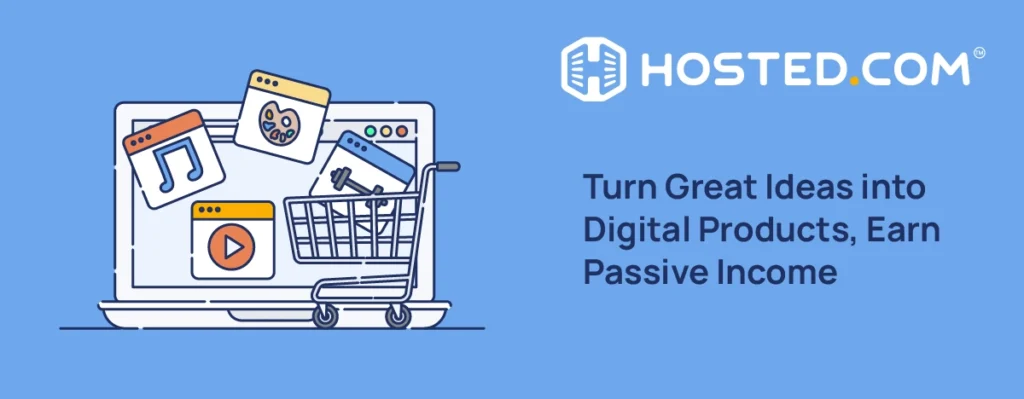
Digital products are the things you can sell and deliver online without ever touching a shipping box. These include eBooks, courses, music files, software, and templates, anything people can download or access through the internet. Here, using a Website Builder makes the process even simpler, letting you design your store, add products, and start selling without advanced technical skills.
In recent years, so many people have started creating and selling digital products. One reason is how easy they are to manage. You don’t need a warehouse or to worry about inventory. Once your digital product is ready, you can sell it to anyone, anywhere, as many times as you want.
This guide will show you how to sell digital products online. We’ll explain what digital products are, the best types to sell, where to sell them, and how to market them effectively. By the end, you’ll be ready to launch your first digital product with confidence.
KEY TAKEAWAYS
- Sell digital products that allow you to reach customers globally without worrying about shipping or storage.
- Choose a niche you know well to make it easier to create valuable products people want.
- Research demand before you start to avoid creating products no one buys.
- High-quality design, clear formatting, and strong branding can make your products stand out.
- The platform you choose affects your control, audience reach, and fees, so compare options carefully.
- Automate delivery to ensure customers get instant access and keep your workload light.
- Pricing should reflect the value of your product and be competitive in your market.
- A sales funnel can help turn visitors into paying customers through targeted offers and follow-ups.
- Marketing through SEO, social media, and email can bring in steady traffic and sales.
- Track performance with analytics to make smarter decisions and grow your business.
TABLE OF CONTENTS
What is a Digital Product?
A digital product is something you create, sell, and deliver entirely online. It doesn’t exist in a physical form, so there’s nothing to ship or store. Customers receive it instantly after purchase, which makes it faster and easier for both the seller and buyer.
Common examples include:
- eBooks: These are downloadable books.
- Templates: These can be used for resumes, presentations, or designs.
- Online Courses: These can comprise videos, worksheets, and quizzes.
Other examples are stock photos, software, music files, and digital art.
The idea is to build a sustainable website that earns you money by selling digital products without spending money for storage space, packaging, or shipping. Because they’re easy to share and scale, digital products have become a popular choice for creators, educators, and entrepreneurs who want to reach customers globally.
Top Digital Products to Sell Online
If you plan to sell digital products online, it’s essential to focus on formats that are already popular and in demand. Here are some of the best categories to consider, along with examples and trends.
eBooks & PDFs
eBooks and PDFs are some of the easiest digital products to create and sell. You can write a guide, a how-to manual, or even a collection of recipes, then make it available for instant download.
Many self-published authors are earning a steady income this way. According to Amazon Kindle Store data, specific niches such as Self-Help and business guides consistently rank among the top-selling eBook categories.
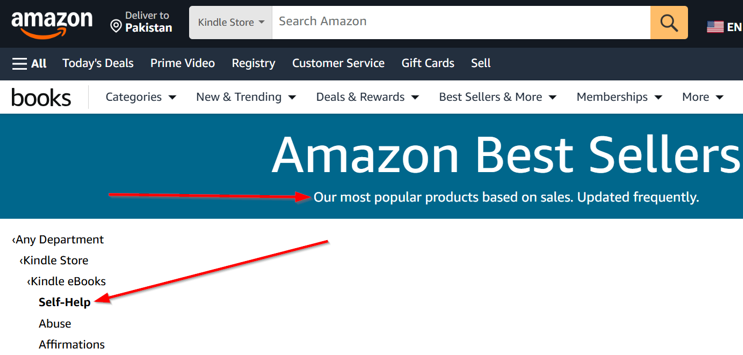
Platforms like Gumroadalso report strong sales for short, well-targeted PDFs, especially when they solve a specific problem.
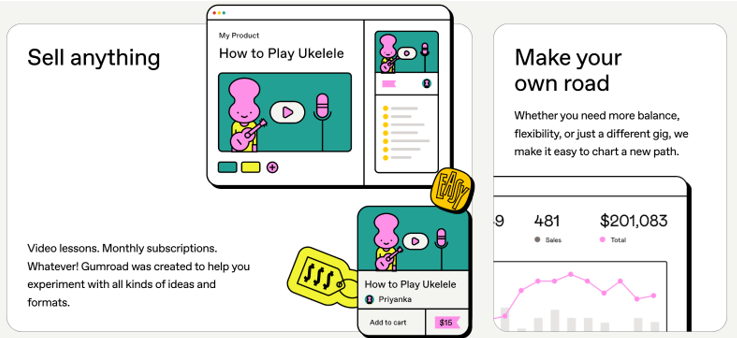
Online Courses
Online courses are in high demand because people want to learn new skills from home. These courses can be video lessons, interactive quizzes, or downloadable study materials.
Statistics have shown that online learning is growing exponentially. You can use Teachable, Udemy, and Podia to host and sell your courses to a global audience. Or, you can build your own tutoring website to sell digital products/courses.
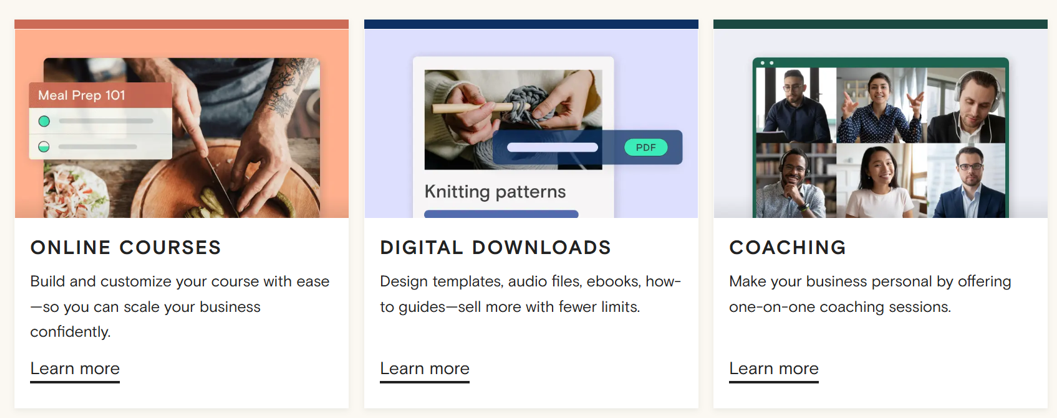
Templates, Tools & Design Assets
Templates save buyers time and effort, which is why they sell so well. You could create resume templates, social media post designs, or business presentation layouts. This explosive demand depicts a strong, growing market for creative entrepreneurs wishing to offer high-quality design templates.

Software & Web Assets
Software and web assets can include mobile apps, website themes, or WordPress plugins. Developers often sell these on CodeCanyon and Flippaor directly from their websites for full control over pricing and branding.

Here are five software ideas you can create and sell:
1. CUSTOM SOFTWARE SOLUTIONS
Businesses and individuals often need tools built for their specific needs. This could be a project management app for remote teams or an inventory system for small retailers. Because custom software solves a targeted problem, it’s easier to charge higher prices and build long-term client relationships.
2. WEBSITE DEVELOPMENT
If you can design and build websites, you can offer services to businesses, bloggers, and entrepreneurs. Competitive pricing is essential, so research industry rates to find the right balance between affordability and profit. You can also showcase your skills through a portfolio, much like how professionals like Anna Franques present their work – see below:

3. MOBILE & WEB APPS
Apps are in high demand for productivity, education, entertainment, and more. Focus on solving a specific problem or making a task easier for your target audience. A well-designed app can attract loyal users and even generate ongoing revenue through subscriptions or premium features.
4. PLUGINS
Plugins enhance the functionality of platforms like WordPress or Shopify. You can create SEO optimization tools, payment gateway integrations, or custom design features. Since plugins address specific needs, they often gain traction quickly among niche audiences.
5. WEBSITE THEMES
High-quality themes save users time and effort when building their websites. By designing themes for WordPress, you can reach a wide range of customers, from bloggers to small business owners, wanting professional, easy-to-use designs.
Tip: Whether you choose to sell digital products like custom software, themes, or plugins, ensure your product is easy to use, well-documented, and regularly updated. This not only enhances customer satisfaction but also increases the chances of repeat sales.
Audio, Music & Podcasts
If you’re a musician, podcaster, or audio editor, selling sound files such as music tracks, sound effects, or podcast episodes can be a highly profitable niche. It’s because fans get instant access to their purchase without waiting for shipping, which boosts satisfaction and repeat sales.
Streaming and digital sales have become the core of the music industry’s revenue. This shift reveals that audiences increasingly prefer digital formats over physical ones.

With this growing digital demand, selling your audio work online puts you right where the listeners are (and the money is).
Why Sell Digital Products in 2025?
Selling digital products offers big advantages for creators and business owners. Since there’s no physical inventory, you avoid costs related to storage, packaging, and shipping. This means higher profit margins and more flexibility in pricing.
One of the advantages is that digital products reduce fulfillment time by over 95% compared to physical goods, allowing customers to receive their purchase instantly after payment.
Another benefit is scalability. Once your digital product is ready, you can sell it to one customer or thousands without needing extra production time or resources. This makes it easier to grow your business without adding operational stress.
According to a hosting engineer from Hosted.com®, “Digital goods scale faster because infrastructure doesn’t limit delivery. We optimize every store hosted on Hosted.com® to handle spikes without delay.”
With fast delivery, low overhead, and unlimited sales potential, digital products are a smart way to build a sustainable online income stream in 2025.
Now, you know the reason why you should sell digital products. Let’s understand how much you can earn from this:
Earnings from selling digital products can vary widely. Many creators earn around $1,000-$2,000 per month, but the exact amount depends on the type of product you sell, and your target audience.
Here’s a breakdown of how much you can potentially earn from different product types:
- eBooks & PDFs: PDF downloads can earn up to $1,000 a month if they address a specific need. eBooks, on the other hand, often earn $2-$5 per month for beginners after platform fees. Experienced sellers with several years of sales experience can reach $45,000 in total earnings over six or more years.
- Online Courses: If you teach a valuable skill, an online course can make between $1,000 and $10,000 per month.
- Digital Memberships: Creators offering subscription-based memberships often earn around $12,000 in revenue on average, although results can be higher for specialized communities.
- Music & Art: Selling music, such as custom beats, can earn between $100 and $1,000 per month. Digital art can generate $100-$2,000 per month, depending on your pricing and audience demand.
- Online Services: Offering digital services (such as freelancing) can be highly profitable, ranging from $31,000 to $275,000 a year, depending on skills and niche.
- Templates: Well-designed templates are always in demand and can earn you up to $2,000 or more each month.
- Software: The software market offers high-earning potential. Designing WordPress themes can yield $10,000, while creating custom software can earn as much as $146,000 per year.
No matter the type of product you choose, your final profit will depend on how you price it and where you sell it. So, selecting the correct platform and pricing strategy can make a difference to your earnings.
Sell Digital Products online with everything you need in one place — Domain Registration, reliable Web Hosting, and create your site with our simple Website Builder.
Hosted.com® also offers professional email, free SSL, and expert support to guide you every step of the way.
How to Sell Digital Products Online
Selling digital products isn’t just about creating something; it’s about ensuring people want it, delivering it smoothly, and promoting it correctly. Here’s a simple process to follow to get started.
Step 1: Find Your Niche
Your niche is the specific market or audience you’ll target. The more focused it is, the easier it will be to stand out. Consider your skills, knowledge or resources, then find out whether there’s real demand for them.
To do this, use Google Trends to see what’s popular or browse Reddit communities to find what people are asking for. For instance, according to Google Trends, demand for “coding tutorial” rose sharply in 2025. This type of research ensures you’re creating something people are actively looking to buy.
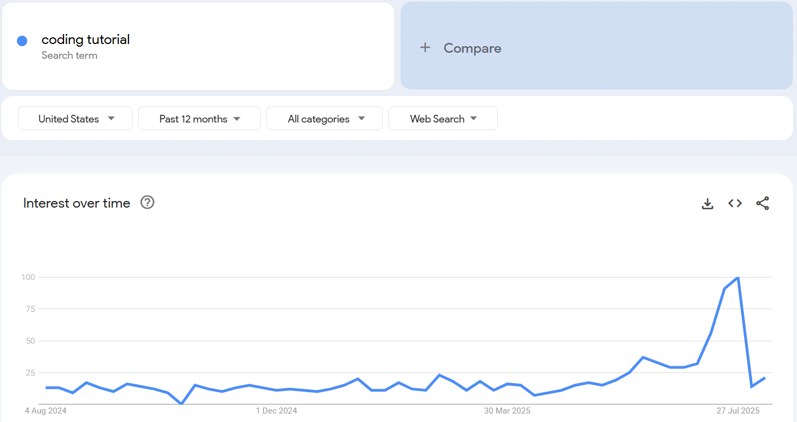
Also, use AnswerThePublicto view common questions or niche forums to learn what people are questioning.
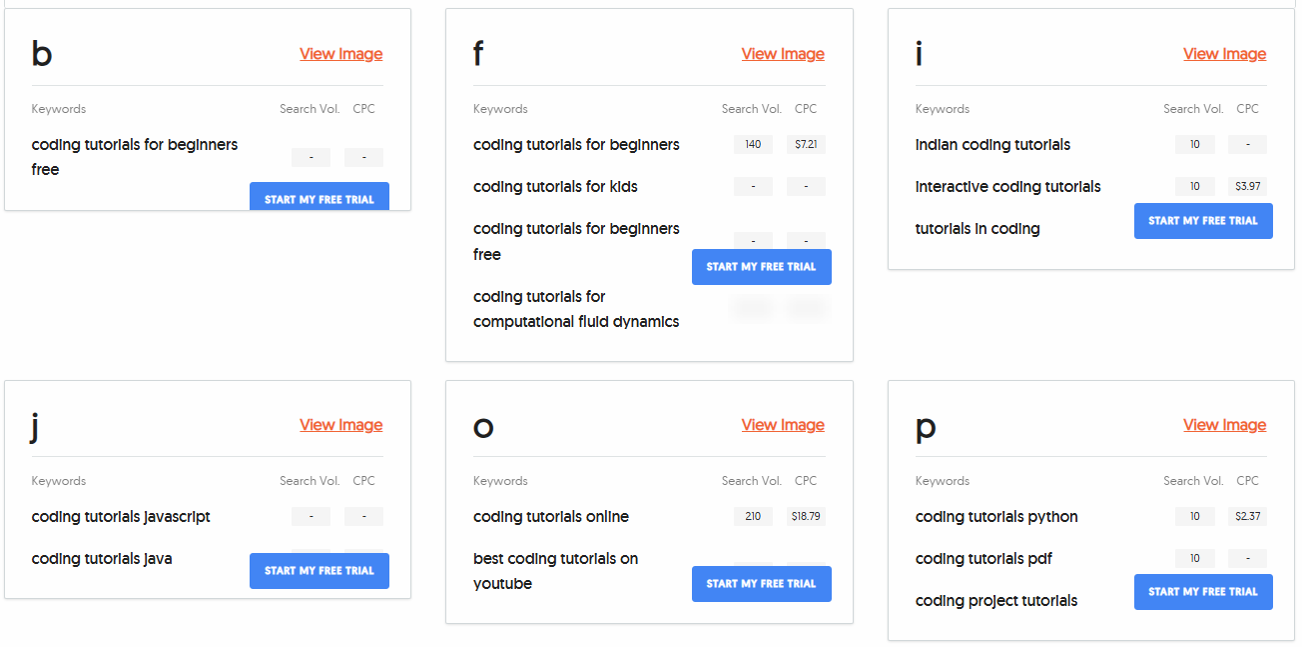
Before spending time on production, always validate your idea to ensure people are willing to pay for it.
Step 2: Create Your Product
Once you’ve confirmed your niche, focus on building a product that solves a real problem or offers clear value. You can use:
- Canva for design.
- Google Docs for writing.
- Loom for recording video tutorials.
- Audacity for audio editing.
Ensure your product looks professional. For this, use clean formatting, organize files neatly (such as in zip folders), and add branding, so it’s easily recognizable. Your product should also offer real value, so customers see it as worth paying for.
Step 3: Choose a Platform to Sell
Where you sell your digital product can make a big difference in your success. Each option has its pros and cons:
| Platform Type | Examples | Pros | Cons |
| Your Own Website | WordPress + WooCommerce, Hosted’s website builder | Full control over branding, customer data, and pricing | You handle all marketing and traffic |
| Marketplaces | Etsy, Gumroad, Payhip | Built-in audience, quick setup | Platform fees, less control over branding |
| Course Platforms | Teachable, Thinkfic, Podia | All-in-one tools for hosting courses | Monthly fees, limited customization |
Remember, online marketplaces attract millions of active buyers annually, offering great exposure. However, if you want complete control and higher profit margins, building your specific website by integrating WooCommerce with WordPress or our website builder may be the better choice.
Step 4: Tools to Help You Sell Digital Products
When you sell digital products, having the right tools makes sales easier, faster, and more professional. Here’s a breakdown of tools by category, so you can choose what fits your needs best.
WEBSITE BUILDERS
A good website builder provides a space for your products and full control over your brand.
1. Hosted.com®’s Builder: Built for speed and ease, it allows instant file delivery with SSL and domain integration so that customers can buy and download securely.

2. WooCommerce Optimized WordPress: Highly customizable, especially with WooCommerce-optimized WordPress hosting for better performance.

Now, which is the best option? Choose the first option if you want to go online fast, focus more on running your business than learning tech, and don’t need advanced custom features right away.
However, select the second option if you want maximum flexibility, plan to grow your site over time, or need advanced features that a website builder can’t easily provide.
DESIGN & CREATION TOOLS
Your product should look great and professional. To do this, use the following tools:
- Canva: Easy to use for eBooks, templates, and social media graphics.
- Adobe Express: Ideal for branding and high-quality visuals.
- ScreenPal: Perfect for recording screen tutorials and walkthroughs.
PAYMENTS & DELIVERY
When you sell digital products online, smooth payments and instant delivery are key to make customers happy. For this, you can use:
- Stripe: A global payment processor that supports credit cards and local payment methods.
- PayPal: Popular and trusted worldwide for quick transactions.
- Easy Digital Downloads (EDD): A WordPress plugin made for selling digital products with secure delivery.
If you use our Website Builder, you’ll get 20+ payment options.
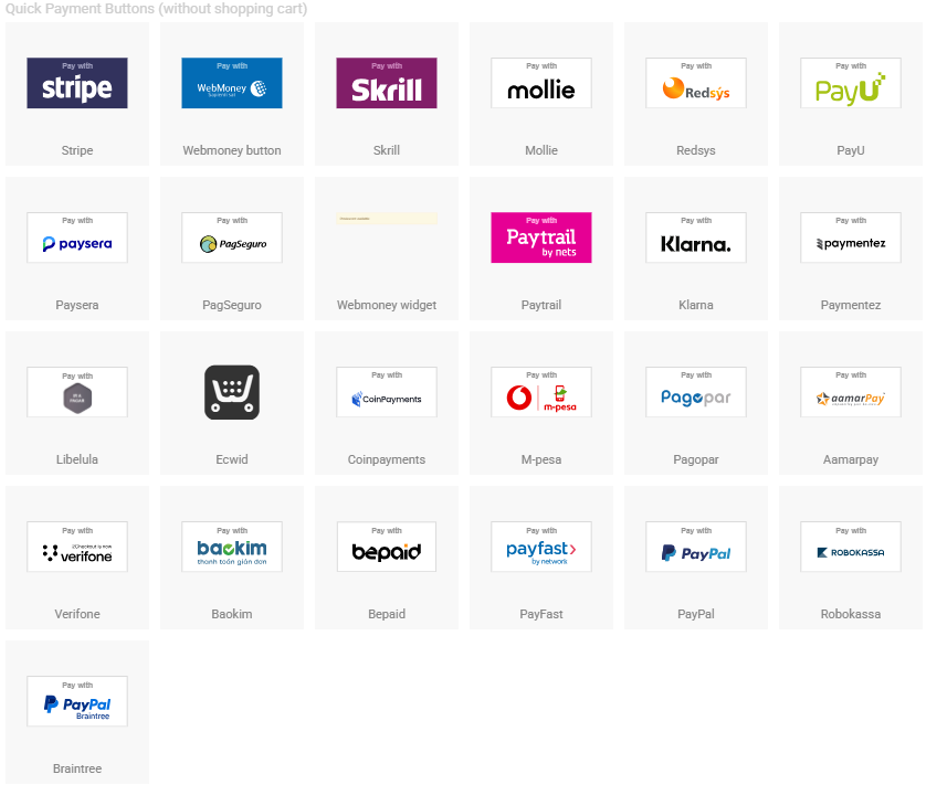
ANALYTICS
Tracking how visitors interact with your store helps you improve. For this, use:
- Google Analytics: Use Google Analytics to track web traffic, conversions, and user behavior.
- Fathom: Privacy-friendly analytics that are easy to understand.
- Hotjar: Offers heatmaps and session recordings to see exactly how customers use your site.
Step 5: Automate Product Delivery
When you sell digital products, automating delivery saves you time and ensures customers get their products instantly after purchase. Various tools make this process easy. They include:
- WooCommerce.
- Easy Digital Downloads (EDD).
- Gumroad.
- Google Drive.
- Dropbox.
You can protect your files with zip encryption, set download limits, or add license keys to prevent unauthorized sharing. This keeps your work secure while and gives buyers a smooth shopping experience.
Step 6: Set the Right Price
Decide your pricing based on the value you offer, not just the cost of production. To do this, start researching your competitors and look for similar products. Then, position yours based on value and quality.
When pricing, consider psychological pricing, such as $9.99 instead of $10, to make the product look more affordable. Some sellers also offer bundle discounts or tiered pricing to appeal to different budgets.
Step 7: Market Your Product
Even the best product won’t sell if people don’t know it exists. This is where your product marketing comes in. To do this effectively, use a mix of tactics:
- SEO: Optimize product pages with keywords your audience searches for.
- Email Marketing: Create a list and send updates, tips, and promotions.
- Content Marketing: Write blogs or create videos related to your product’s niche.
- Social Media: Share engaging posts, reels, or pins to attract buyers.
Here, tools like MailerLite (email marketing), SurferSEO (SEO), and Buffer (social scheduling) make these tasks easier.
According to HubSpot’s 2025 State of Marketing report, email marketing delivers a $36 return for every $1 spent. That’s why building an email list early is one of the most profitable moves you can make. (Report Link)
Step 8: Legal & Technical Considerations
When selling digital products, it’s crucial to protect both your business and your customers. Paying attention to legal and technical details helps you avoid problems and build trust.
Add License or Usage Terms
Always clarify how buyers can use your product. For example, you may sell it for personal use only, meaning they can’t resell or share it, or for commercial use, allowing them to use it in their specific business projects. Clearly stating these terms on your product page and in your downloadable files will help prevent misuse.
Set Refund Policies Clearly
Since digital products can be downloaded instantly, many sellers have a no-refund policy. If you offer refunds, explain the conditions, e.g., only for duplicate purchases or technical issues. Display this policy on your website so buyers know what to expect before a purchase.
Add Taxes & GDPR Compliance
If you sell internationally, you may need to collect taxes, such as VAT or sales tax, depending on the buyer’s location. Use your payment processor or an ecommerce plugin to calculate these automatically.
Also, if you collect personal data (such as names or emails), you must follow privacy laws like GDPR in the EU. This means telling customers how their data may be used and offering them the option to opt out.
Use SSL for a Secure Checkout
Security is non-negotiable when handling online payments. An SSL certificate encrypts data between your site and the customer, protecting sensitive information such as credit card numbers.
You can check for SSL on a site by looking for the https in the web address. Most hosting providers, including Hosted.com®, include free SSL certificates with their web hosting plans.
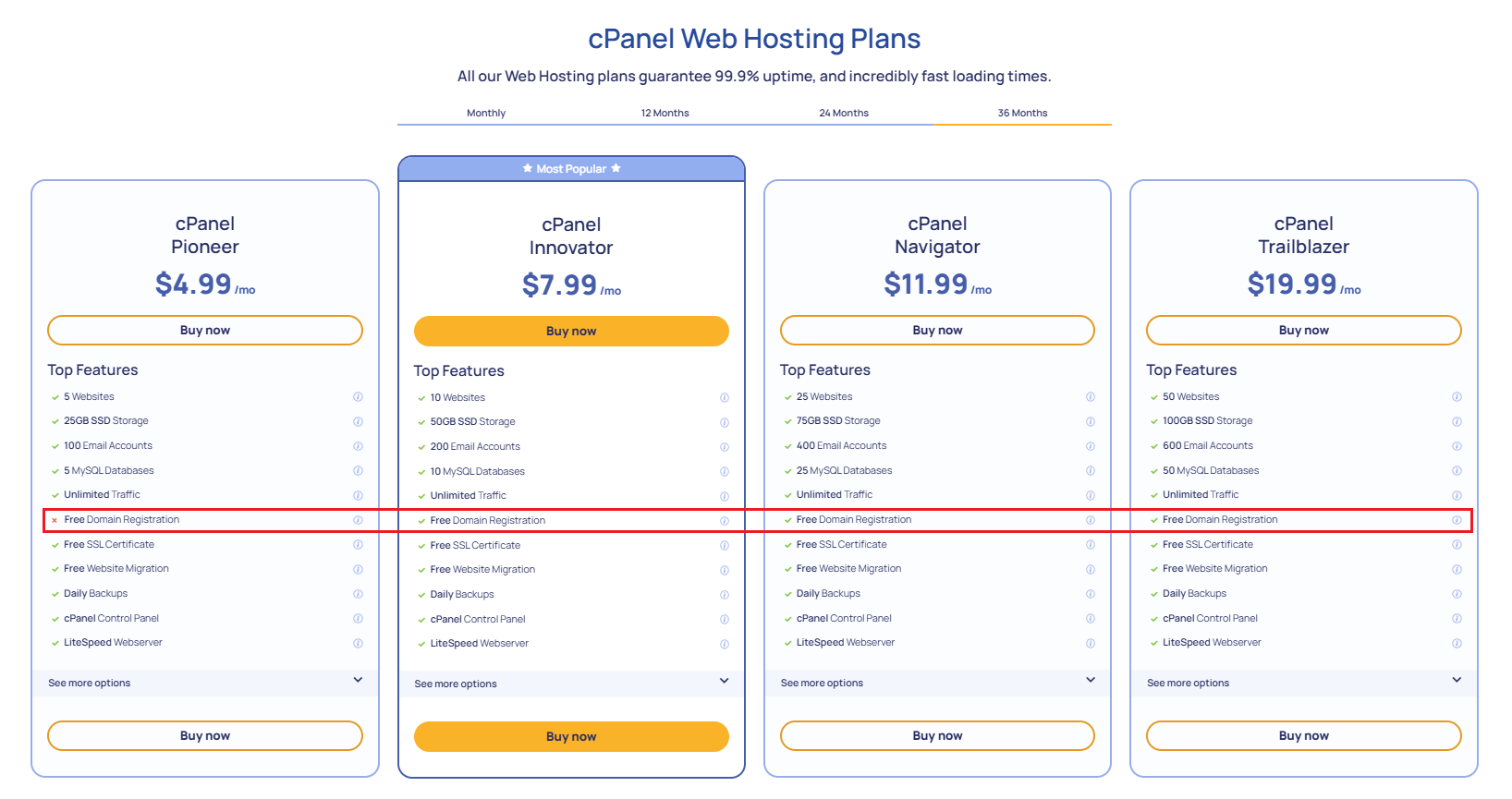
How to Scale Your Digital Product Sales
Once you start to sell digital products online and its steadily, the next step is to grow your revenue. Scaling isn’t just about producing more products; it’s about improving how you sell and deliver digital products.
One effective method is adding upsells. This could be bundles, premium versions, or related add-ons that increase the value of each sale. You can also launch an affiliate program, so others promote your products and receive commission. Affiliates can help you reach audiences you might not be able to access on your own.
Limited-time offers are another way to encourage quick purchases. By creating urgency, you can motivate customers to buy now rather than later. It’s also smart to A/B test your product pages. This means trying various headlines, images, or prices to find which version gets the most sales.
Common Mistakes Beginners Make
Many beginners run into the same problems when starting out, so avoiding these can save you time and money.
- Not Validating Product Idea: Skipping market research can lead to creating something no one wants to buy.
- Using Only Free Tools & Expecting Fast Results: Free tools are useful, but sometimes investing in premium features or hosting can improve quality and sales.
- Skipping Legal Terms & Licenses: Without clear usage rights and policies, you risk disputes or misuse of your content.
- Ignoring Marketing & SEO: Even the best products won’t sell if your potential audience can’t find them. Consistent promotion and search optimization are essential to improve your online store’s visibility.
![Start selling digital products with Hosted.com®'s all-in-one Hosting and Store Builder. [Learn More] Start selling digital products with Hosted.com®'s all-in-one Hosting and Store Builder. [Learn More]](https://www.hosted.com/blog/wp-content/uploads/2025/08/sell-digital-products-02-1024x229.webp)
FAQS
What file types are best for digital product delivery?
The best file type depends on your product. PDFs are great for eBooks, guides, and printables, because they’re easy to open on most devices. ZIP files are useful if you deliver multiple files at once, such as templates or images. MP4 is a great choice for video, and MP3 works well for audio products. Always choose formats that are widely supported so customers can access them without needing extra software.
Can I sell digital products internationally?
Yes, you can, if your payment processor supports international transactions. You’ll need to ensure your delivery system works globally and that you stick to local tax rules, such as collecting VAT in the EU if required.
What’s the best pricing strategy for beginners?
If you’re starting, research competitors in your niche to see what customers pay. Start with a fair, competitive price that reflects the value you provide. You may also test different price points to find what works best. As your brand grows, you can adjust your pricing or offer premium versions.
Do I need a business license or tax setup?
In many places, you don’t need a special license to sell digital products, but you do need to follow your local business and tax laws. This may include registering your business, reporting income, and collecting sales tax or VAT where required. It’s a good idea to check your local regulations before launching.
What’s the easiest platform to sell digital products?
If you want something quick and simple, marketplaces like Gumroad or Etsy are great because they handle payments and delivery for you. If you want more control over branding and customer data, platforms like WordPress with WooCommerce or Hosted.com®’s Website Builder are easy to set up and give you room for growth.
Other Blogs of Interest
– 5 Tips to Successfully Scale An Online Business
– Essential Website SEO Tools to Boost Your Online Presence
– How To Secure A Website: Best Practices For Online Safety
– Using The Best Website Builder For Online Store
– Cloud Application Security: Protecting Your Business Online
– Social Search: Transforming How We Discover Content Online
- About the Author
- Latest Posts
Chantél Venter is a creative writer, strategic thinker, and a serious gesticulator. She’s passionate about storytelling, small businesses and bringing color to the world – be it through her words or wardrobe.
She holds a four-year degree in Business and Mass Media Communication and Journalism. She’s been a copywriter and editor for the technology, insurance and architecture industries since 2007 and believes anybody can run a small business successfully. She therefore enjoys finding and sharing the best and most practical tips for this purpose.

















